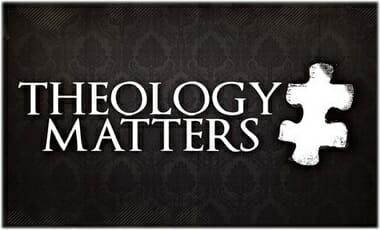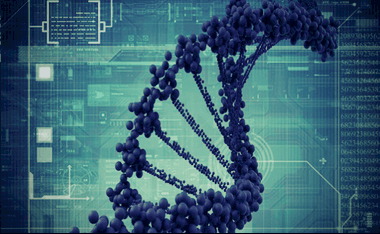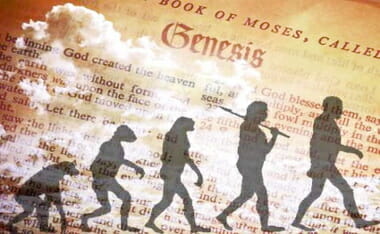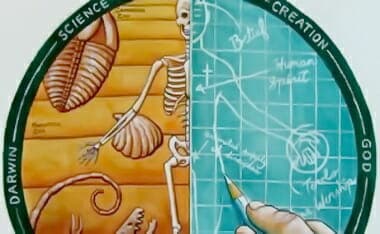What follows is the section of the book Professor Wayne Grudem was touching on in his class:
- Wayne Grudem, Systematic Theology: An Introduction To Biblical Doctrine (Grand Rapids, MI: Zondervan, 2000), 275-279.

2. Some Theories About Creation Seem Clearly Inconsistent With the Teachings of Scripture. In this section we will examine three types of explanation of the origin of the universe that seem clearly inconsistent with Scripture.
a. Secular Theories: For the sake of completeness we mention here only briefly that any purely secular theories of the origin of the universe would be unacceptable for those who believe in Scripture. A “secular” theory is any theory of the origin of the universe that does not see an infinite-personal God as responsible for creating the universe by intelligent design. Thus, the “big bang” theory (in a secular form in which God is excluded), or any theories that hold that matter has always existed, would be inconsistent with the teaching of Scripture that God created the universe out of nothing, and that he did so for his own glory. (When Darwinian evolution is thought of in a totally materialistic sense, as it most often is, it would belong in this category also.)19
b. Theistic Evolution: Ever since the publication of Charles Darwin’s book Origin of Species by Means of Natural Selection (1859), some Christians have proposed that living organisms came about by the process of evolution that Darwin proposed, but that God guided that process so that the result was just what he wanted it to be. This view is called theistic evolution because it advocates belief in God (it is “theistic”) and in evolution too. Many who hold to theistic evolution would propose that God intervened in the process at some crucial points, usually (1) the creation of matter at the beginning, (2) the creation of the simplest life form, and (3) the creation of man. But, with the possible exception of those points of intervention, theistic evolutionists hold that evolution proceeded in the ways now discovered by natural scientists, and that it was the process that God decided to use in allowing all of the other forms of life on earth to develop. They believe that the random mutation of living things led to the evolution of higher life forms through the fact that those that had an “adaptive advantage” (a mutation that allowed them to be better fitted to survive in their environment) lived when others did not.
Theistic evolutionists are quite prepared to change their views of the way evolution came about, because, according to their standpoint, the Bible does not specify how it happened. It is therefore up to us to discover this through ordinary scientific investigation. They would argue that as we learn more and more about the way in which evolution came about, we are simply learning more and more about the process that God used to bring about the development of life forms.
The objections to theistic evolution are as follows:
1. The clear teaching of Scripture that there is purposefulness in God’s work of creation seems incompatible with the randomness demanded by evolutionary theory. When Scripture reports that God said, “Let the earth bring forth living creatures according to their kinds: cattle and creeping things and beasts of the earth according to their kinds” (Gen. 1:24), it pictures God as doing things intentionally and with a purpose for each thing he does. But this is the opposite of allowing mutations to proceed entirely randomly, with no purpose for the millions of mutations that would have to come about, under evolutionary theory, before a new species could emerge.
The fundamental difference between a biblical view of creation and theistic evolution lies here: the driving force that brings about change and the development of new species in all evolutionary schemes is randomness. Without the random mutation of organisms you do not have evolution in the modem scientific sense at all. Random mutation is the underlying force that brings about eventual development from the simplest to the most complex life forms. But the driving force in the development of new organisms according to Scripture is God’s intelligent design. God created “the great creatures of the sea and every living and moving thing with which the water teems, according to their kinds, and every winged bird according to its kind” (Gen. 1:21 Niv). “God made the wild animals according to their kinds, the livestock according to their kinds, and – all the creatures that move along the ground according to their kinds. And God saw that it was good” (Gen. 1:25 my). These statements seem inconsistent with the idea of God creating or directing or observing millions of random mutations, none of which were “very good” in the way he intended, none of which really were the kinds of plants or animals he wanted to have on the earth. Instead of the straightforward biblical account of God’s creation, the theistic evolution view has to understand events to have occurred something like this:
And God said, “Let the earth bring forth living creatures according to their kinds.” And after three hundred eighty-seven million four hundred ninety-two thousand eight hundred seventy-one attempts, God finally made a mouse that worked.
That may seem a strange explanation, but it is precisely what the theistic evolutionist must postulate for each of the hundreds of thousands of different kinds of plants and animals on the earth: they all developed through a process of random mutation over millions of years, gradually increasing in complexity as occasional mutations turned out to be advantageous to the creature.
A theistic evolutionist may object that God intervened in the process and guided it at many points in the direction he wanted it to go. But once this is allowed then there is purpose and intelligent design in the process—we no longer have evolution at all, because there is no longer random mutation (at the points of divine interaction). No secular evolutionist would accept such intervention by an intelligent, purposeful Creator. But once a Christian agrees to some active, purposeful design by God, then there is no longer any need for randomness or any development emerging from random mutation. Thus we may as well have God immediately creating each distinct creature without thousands of attempts that fail.
2. Scripture pictures God’s creative word as bringing immediate response. When the Bible talks about God’s creative word it emphasizes the power of his word and its ability to accomplish his purpose.
By the word of the LORD the heavens were made,
and all their host by the breath of his mouth.
For he spoke, and it came to be;
he commanded, and it stood forth. (Ps. 33:6, 9)
This kind of statement seems incompatible with the idea that God spoke and after millions of years and millions of random mutations in living things his power brought about the result that he had called for. Rather, as soon as God says, “Let the earth put forth vegetation,” the very next sentence tells us, “And it was so” (Gen. 1:11).
3. When Scripture tells us that God made plants and animals to reproduce “according to their kinds” (Gen. 1:11, 24), it suggests that God created many different types of plants and animals and that, though there would be some differentiation among them (note many different sizes, races, and personal characteristics among human beings!), nonetheless there would be some narrow limits to the kind of change that could come about through genetic mutations.20
4. God’s present active role in creating or forming every living thing that now comes into being is hard to reconcile with the distant “hands off” kind of oversight of evolution that is proposed by theistic evolution. David is able to confess, “You formed my inward parts, you knit me together in my mother’s womb” (Ps. 139:13). And God said to Moses, “Who has made man’s mouth? Who makes him dumb, or deaf, or seeing, or blind? Is it not I, the Lord?” (Ex. 4:11). God makes the grass grow (Ps. 104:14; Matt. 6:30) and feeds the birds (Mau. 6:26) and the other creatures of the forest (Ps. 104:21, 27-30). If God is so involved in causing the growth and development of every step of every living thing even now, does it seem consistent with Scripture to say that these life forms were originally brought about by an evolutionary process directed by random mutation rather than by God’s direct, purposeful creation, and that only after they had been created did he begin his active involvement in directing them each moment?
5. The special creation of Adam, and Eve from him, is a strong reason to break with theistic evolution. Those theistic evolutionists who argue for a special creation of Adam and Eve because of the statements in Genesis 1-2 have really broken with evolutionary theory at the point that is of most concern to human beings anyway. But if, on the basis of Scripture, we insist upon God’s special intervention at the point of the creation of Adam and Eve, then what is to prevent our allowing that God intervened, in a similar way, in the creation of living organisms?
We must realize that the special creation of Adam and Eve as recorded in Scripture shows them to be far different from the nearly animal, just barely human creatures that evolutionists would say were the first humans, creatures who descended from ancestors that were highly developed nonhuman apelike creatures. Scripture pictures the first man and woman, Adam and Eve, as possessing highly developed linguistic, moral, and spiritual abilities from the moment they were created. They can talk with each other. They can even talk with God. They are very different from the nearly animal first humans, descended from nonhuman apelike creatures, of evolutionary theory.
Some may object that Genesis 1-2 does not intend to portray Adam and Eve as literal individuals, but (a) the historical narrative in Genesis continues without a break into the obviously historical material about Abraham (Gen. 12), showing that the author intended the entire section to be historical,21 and (b) in Romans 5:12-21 and 1 Corinthians 15:21-22, 45-49, Paul affirms the existence of the “one man” Adam through whom sin came into the world, and bases his discussion of Christ’s representative work of earning salvation on the previous historical pattern of Adam being a representative for mankind as well. Moreover, the New Testament elsewhere clearly understands Adam and Eve to be historical figures (cf. Luke 3:38; Acts 17:26; 1 Cor. 11:8-9; 2 Cor. 11:3; 1 Tim. 2:13-14). The New Testament also assumes the historicity of the sons of Adam and Eve, Cain (Heb. 11:4; 1 John 3:12; Jude 11) and Abel (Matt. 23:35; Luke 11:51; Heb. 11:4; 12:24).
6. There are many scientific problems with evolutionary theory (see the following section). The increasing number of questions about the validity of the theory of evolution being raised even by non-Christians in various scientific disciplines indicates that anyone who claims to be forced to believe in evolution because the “scientific facts” leave no other option has simply not considered all the evidence on the other side. The scientific data do not force one to accept evolution, and if the scriptural record argues convincingly against it as well, it does not seem to be a valid theory for a Christian to adopt.
It seems most appropriate to conclude in the words of geologist Davis A. Young, “The position of theistic evolutionism as expressed by some of its proponents is not a consistently Christian position. It is not a truly biblical position, for it is based in part on principles that are imported into Christianity.”22 According to Louis Berkhof “theistic evolution is really a child of embarrassment, which calls God in at periodic intervals to help nature over the chasms that yawn at her feet. It is neither the biblical doctrine of creation, nor a consistent theory of evolution.”23
[19] See pp. 279-87 below, for a discussion of Darwinian evolution.
[20] “We do not need to insist that the Hebrew word min (“kind”) corresponds exactly with the biological category “species,” for that is simply a modern means of classifying different living things. But the Hebrew word does seem to indicate a narrow specification of various types of living things. It is used, for example, to speak of several very specific types of animals that bear young and are distinguished according to their “kind.” Scripture speaks of “the falcon according to its kind,” “every raven according to its kind,” “the hawk according to its kind,” “the heron according to its kind,” and “the locust according to its kind” (Lev. 11:14, 15, 16, 19, 22). Other animals that exist according to an individual “kind” are the cricket, grasshopper, great lizard, buzzard, kite, sea gull, and stork (Lev. 11:22, 29; Deut. 14:13, 14, 15, 18). These are very specific kinds of animals, and God created them so that they would reproduce only according to their own “kinds.” It seems that this would allow only for diversification within each of these types of animals (larger or smaller hawks, hawks of different color and with different shapes of beaks, etc.), but certainly not any “macroevolutionary” change into entirely different kinds of birds. (Frair and Davis, A Case for Creation, p. 129, think that “kind” may correspond to family or order today, or else to no precise twentieth-century equivalent.)
[21] Note the phrase “These are the generations of” introducing successive sections in the Genesis narrative at Gen. 2:4 (heavens and the earth); 5:1 (Adam); 6:9 (Noah); 10:1 (the sons of Noah); 11:10 (Shem); 11:27 (Terah, the father of Abraham); 25:12 (Ishmael); 25:19 (Isaac); 36:1 (Esau); and 37:2 (Jacob). The translation of the phrase may differ in various English versions, but the Hebrew expression is the same and literally says, “These are the generations of….” By this literary device the author has introduced various sections of his historical narrative, tying it all together in a unified whole, and indicating that it is to be understood as history-writing of the same sort throughout. If the author intends us to understand Abraham, Isaac, and Jacob as historical figures, then he also intends us to understand Adam and Eve as historical figures.
[22] Davis A. Young, Creation and the Flood: An Alternative to Flood Geology and Theistic Evolution (Grand Rapids: Baker, 1977), p. 38. Young includes a discussion of the views of Richard H. Bube, one of the leading proponents of theistic evolution today (pp. 33-35).
[23] Berkhof, Systematic Theology, pp. 139-40.
BONUS
This is John Mackay’s opening statement in a larger debate that can be found here, on Mackay’s YouTube. Defending the evolutionary position is John Polkinghorne, a retired Physics Professor and is Canon Theologian at Liverpool Cathedral. John Mackay is a young earth creationist who has a background in geology and biology. He has given presentations like this (on various topics) for 30 years.
- John Mackay’s website, Creation Research can be found here: Creation Research (a dated website, needs to be refreshed). The YOUTUBE CHANNEL is way more current.
Faith + Evolution – Although there are some theistic evolutionists in the Intelligent Design Movement (like Michael Behe and William Dembski) they are not radical like the Neo-Darwinian evolutionists. This video shows the many problems of theistic evolution. (Appearances by: Jay Richards, John G. West, Jonathan Wells, Richard Sternberg, Stephen Meyer)



